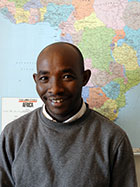Lunch seminar: House Construction Practices and Social Dynamics in Konso, Southwest Ethiopia
The Konso live in southwest Ethiopia, and are known for their traditional stone-walled villages and soil and water conservation system. Homesteads, mainly built in the stone-walled villages, contain traditional houses constructed by skilled members of the respective villages. Well-built traditional houses can last up to three or four generations, and the types of houses define the symbolic, social and spiritual functions of the society and owners. However, like other forms of indigenous knowledge, traditional house construction practices in Konso started to experience changes following the incorporation of the Konso people into the nation-state building project of Emperor Minilik in the late 19th century. The last three decades have demonstrated rapid changes in the status quo of the house construction practices especially due to such factors as high population pressure, shifting perceptions, expansion of schools, churches, and urbanization. These factors have resulted in the introduction of new building materials, perceiving traditional houses as backward, and monetarized skills. Another form of change in Konso is the inscription of the Konso Cultural Landscape as a world heritage by UNESCO in 2011.The inscription profoundly raised self-esteem among the Konso people and motivated them to revitalize some of the disappearing cultural practices. Nevertheless, the last three years have witnessed another form of dynamics, this time, political crisis which has resulted, among others, in the burning down of houses. With an insider perspective, this study provides an ethnographic analysis of the changes and continuity of house construction practices in Konso.
Speaker
 Ongaye Oda Orkaydo received his BA and MA in Linguistics from Addis Ababa University, Ethiopia, in 2000 and 2004, respectively. He also received his PhD in Linguistics from Leiden University, the Netherlands, in 2013. His research interests include, but not limited to, grammar writing, dictionary making, mother tongue education (planning, implementation and evaluation), interdisciplinary research activities that involve language and communication (anthropology, sociology, development studies, environmental studies, gender studies, etc.). He has published three books: A Grammar of Konso (2013), A Grammar of K’abeena (2014), and A Grammar of Silt’e (2017). He has also (co-)published several articles, and carried out research activities on T’ambaro and Gedeo languages. After his PhD, he won a visiting fellowship from the University of Turin, Italy, in 2016. He is a full time academic staff member at Dilla University, Ethiopia, teaching courses on Linguistics in the Department of English Language and Literature, and conducting research activities in the Institute of Indigenous Studies. Furthermore, he is a member of the Scientific Board of Keravan, International Journal of Afro-Asiatic Studies, University of Turin.
Ongaye Oda Orkaydo received his BA and MA in Linguistics from Addis Ababa University, Ethiopia, in 2000 and 2004, respectively. He also received his PhD in Linguistics from Leiden University, the Netherlands, in 2013. His research interests include, but not limited to, grammar writing, dictionary making, mother tongue education (planning, implementation and evaluation), interdisciplinary research activities that involve language and communication (anthropology, sociology, development studies, environmental studies, gender studies, etc.). He has published three books: A Grammar of Konso (2013), A Grammar of K’abeena (2014), and A Grammar of Silt’e (2017). He has also (co-)published several articles, and carried out research activities on T’ambaro and Gedeo languages. After his PhD, he won a visiting fellowship from the University of Turin, Italy, in 2016. He is a full time academic staff member at Dilla University, Ethiopia, teaching courses on Linguistics in the Department of English Language and Literature, and conducting research activities in the Institute of Indigenous Studies. Furthermore, he is a member of the Scientific Board of Keravan, International Journal of Afro-Asiatic Studies, University of Turin.

